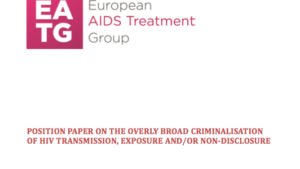Overview
Cyprus does not have any HIV-specific criminal laws, however general disease provisions exist which may be used to prosecute people living with HIV.
Article 190 of the Criminal Code makes it an offence for anyone to do any act which they know, or have reason to believe, is likely to cause the spread of a disease ‘dangerous to life’. This provision is a misdemeanour, which under Article 35, are punishable by up to two years’ imprisonment and/or a fine.
Additionally, an archaic statute (the ‘Quarantine Law’) adopted in 1957 during British colonial rule which was intended to prevent the spread of infectious diseases such as cholera, typhoid, smallpox, and yellow fever, continues to apply in Cyprus and is relevant to the criminalisation of HIV. AIDS Action Europe reports that this law imposes an obligation on medical practitioners to report to the government anyone suspected of living with HIV, with a failure to do so liable to imprisonment for up to one year and/or a fine.
There have been two reported cases of HIV-related prosecutions in Cyprus under the auspices of the Quarantine Law. In the first case, in 1997, a man was sentenced to 15 months’ imprisonment for alleged HIV transmission through sex. The defendant claimed to have disclosed his HIV status but his defence was not accepted.
In the second case, a woman living with HIV was sentenced to seven months’ imprisonment in 1998 for having sex with two people without disclosing her status. Although she agreed that she had not disclosed her status prior to having sex, she also stated that she had always used protection, however the court rejected this defence. HIV was not transmitted in this case.
In its 2023 report, HIV Criminalisation in the EU, AIDS Action Europe cited a more recent case in 2020 in which a man’s HIV status was taken as an aggravating factor in an incident of physical violence.
Additionally, the law prohibits people living with contagious diseases ‘dangerous to public health’ from entering the country, and this has been used in at least one case. In this case reported in 2022, a migrant student was issued with a deportation order on account of his HIV status. Following strong backlash and advocacy by civil society organisations, the decision was overturned and the student was issued a residence permit, however, a statement by the migration department suggested this was seemingly based on the student being non-contagious (presumably due to having an undetectable viral load), meaning that people living with HIV who are not undetectable are at risk of deportation from Cyprus.
Laws
Criminal Code
Article 190. Negligent act likely to spread infection of disease dangerous to life
Any person who unlawfully or negligently does any act which is, and which he knows or has reason to believe to be, likely to spread the infection of any disease, dangerous to life, is guilty of a misdemeanour.
Quarantine law
Acknowledgements
Our thanks to Australian law firm Hall & Wilcox for their research assistance to confirm current relevant legislation.
HIV Justice Network's Positive Destinations
Visit the Cyprus page on Positive Destinations for information on regulations that restrict entry, stay, and residency based on HIV-positive status, as well as access to HIV treatment for non-nationals.
